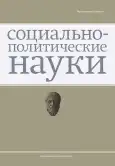Sociopolitical views of Ludwig Feuerbach
- Authors: Zubov V.V.1
-
Affiliations:
- Financial University under the Government of the Russian Federation
- Issue: Vol 13, No 2 (2023)
- Pages: 98-106
- Section: Sociopolitical research
- URL: https://bakhtiniada.ru/2223-0092/article/view/145527
- DOI: https://doi.org/10.33693/2223-0092-2023-13-2-98-106
- ID: 145527
Cite item
Abstract
In the proposed publication the author, based on the methodology of analysis, the comparative philosophical method, as well as the methods of literal, conceptual and contextual interpretation of philosophical works, considers the problem of finding a materialistic component in the sociopolitical views of Ludwig Feuerbach. Comprehending the contribution of L. Feuerbach to the dialectical-materialistic method of cognition of reality, widely used in modern social science, the author establishes that the thinker had a significant impact on the formation of the philosophical component of Marxist theory, in line with which for the first time it was possible to synthesize the dialectic of the absolute with materialistic anthropology. The disclosure of the historical and philosophical context of the origin of the views of L. Feuerbach is carried out on the basis of an analysis of the works of Immanuel Kant (a priori philosophy), Johann Gottlieb Fichte (the philosophy of the supersubject), Friedrich Wilhelm Joseph Schelling (the philosophy of the identical Absolute), Georg Wilhelm Friedrich Hegel (the dialectic of the absolute idea). Based on the results of such an analysis, it is concluded that Feuerbach, being a materialist philosopher, overcame the idealistic views of Kant, Fichte, Schelling and Hegel, but he managed to draw and develop many components from their views (first of all, the dialectical method and the optimistic perception of human entities). Analyzing in detail the sociopolitical ideas of L. Feuerbach in terms of materialistic anthropology, the chanting of the “religion of man” and the apology of freedom, the author establishes that Feuerbach was able to extend the materialistic approach as such to the study of man, social relations, religion, politics and the state. In conclusion, it is deduced that Feuerbach’s belonging to the number of materialist philosophers who extended the materialistic approach not only to nature, but also to society, directly depends on how to understand the essence of materialism: from the standpoint of Marxist reductionism or from the standpoint of interpreting materialism as a study objective reality.
Full Text
##article.viewOnOriginalSite##About the authors
Vadim V. Zubov
Financial University under the Government of the Russian Federation
Author for correspondence.
Email: zubov305@yandex.ru
ORCID iD: 0000-0001-6446-3221
Candidate of History; associate professor at the Department of Political Science of the Financial University under the Government of the Russian Federation. Moscow, Russian Federation.
Russian Federation, MoscowReferences
- Bessonov B.N. History of philosophy: Textbook. Moscow: Yurayt, 2010. 278 p.
- Hegel G.V.F. The science of logic. In 3 vols. Vol. 1. Moscow: Mysl, 1970. 501 p.
- Hegel G.V.F. The science of logic. In three volumes. Vol. 2. M.: Mysl, 1971. 248 p.
- Golbach P.A. The system of nature, or On the laws of the physical world and the spiritual world. Moscow: State Publishing House, 1924. 578 p.
- Kant I. Criticism of pure reason. Moscow: Eksmo, 2014. 736 p.
- Marx K., Engels F. Essays. Second edition. In 50 vols. Vol. 21. Moscow: Publishing House of Political Literature, 1961. 746 p.
- Marx K., Engels F. Essays. Second edition. In 50 vols. Vol. 42. Moscow: Publishing House of Political Literature, 1974. 515 p.
- Narsky I.S. Western European philosophy of the XIX century: Textbook manual. Moscow: Higher school, 1976. 584 p.
- Oizerman T.I. The emergence of Marxism. Moscow: Canon+ ROOI “Rehabilitation”, 2011. 599 p.
- Russell B. History of Western Philosophy. Moscow: AST, 2010. 831 p.
- Rutkevich M.N. Dialectics and sociology. Moscow: Mysl, 1980. 356 p.
- Rutkevich M.N. Society as a system. Sociological essays. St. Petersburg: Aleteya, 2001. 444 p.
- Trushkov V.V. Philosophy: Studies manual. Moscow: Bylina, 2004. 272 p.
- Feuerbach L. Selected philosophical works. In 2 vols. Vol. 1. Moscow: State Publishing House of Political Literature, 1955. 676 p.
- Feuerbach L. Selected philosophical works. In 2 vols. Vol. 2. Moscow: State Publishing House of Political Literature, 1955. 943 p.
- Fichte I. G. Works in two volumes. Vol. II. St. Petersburg: Mithril, 1993. 798 p.
- Zubov V.V. The category of matter in the ontology and epistemology of Holbach and Lenin: Identity and difference. Humanitarian Bulletin. 2021. No. 2. Pp. 1–15. (In Rus.)
Supplementary files








